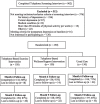Randomized trial examining the effect of exercise and wellness interventions on preventing postpartum depression and perceived stress
- PMID: 34802425
- PMCID: PMC8607568
- DOI: 10.1186/s12884-021-04257-8
Randomized trial examining the effect of exercise and wellness interventions on preventing postpartum depression and perceived stress
Abstract
Background: Approximately 13-19% of postpartum women experience postpartum depression and a majority report at least some stress during the postpartum phase. Traditional interventions such as psychotherapy and antidepressant medications are often not feasible or desirable. The purpose of this study was to examine two low cost, brief, accessible interventions designed to prevent postpartum depression and perceived stress among women at high risk.
Methods: Participants (n = 450) who were on average four weeks postpartum, had a history of depression before pregnancy, and exercised less than 60 min per week were randomly assigned to one of the following three conditions: (1) 6-month telephone-based exercise intervention; (2) 6-month telephone-based wellness/support intervention (e.g., healthy eating, sleep, and perceived stress); or (3) usual care.
Results: Overall, 2.4% of participants met criteria for depression at 6 months and 3.6% at 9 months with no differences between groups. At 6 months following randomization, median symptoms of depression were significantly lower among wellness participants compared to usual care participants (b = - 1.00, SE = 0.46, p = .03). Perceived stress at 6 months post-randomization was significantly lower among exercise vs. usual care participants (b = - 2.00, SE = .98, p = .04) and exercise vs. wellness participants (b = - 2.20, SE = 1.11, p = .04).
Conclusions: The wellness intervention was efficacious for preventing symptoms of depression; however, postpartum depression that met the diagnostic criteria was surprisingly low in all conditions among this at risk sample of postpartum women. Exercise interventions may have a protective effect on perceived stress among women at risk for postpartum depression. Practitioners should consider integrating exercise and wellness interventions into postpartum care.
Trial registration: Clinical Trials Number: NCT01883479 (06/21/2013).
Keywords: Depression; Exercise; Postpartum depression; Stress.
© 2021. The Author(s).
Conflict of interest statement
The authors declare that they have no competing interests.
References
-
- Banti S, Mauri M, Oppo A, Borri C, Rambelli C, Ramacciotti D, et al. From the third month of pregnancy to 1 year postpartum. Prevalence, incidence, recurrence, and new onset of depression. Results from the Perinatal Depression–Research & Screening Unit study. Compr Psychiatry. 2011;52(4):343–351. doi: 10.1016/j.comppsych.2010.08.003. - DOI - PubMed
Publication types
MeSH terms
Associated data
LinkOut - more resources
Full Text Sources
Medical
Miscellaneous


